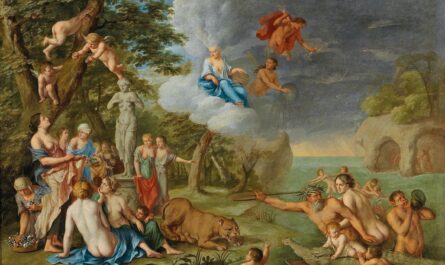The past year served plenty of surprises, but one thing I’m never surprised by is the sheer amount of quality information easily accessed online. We truly live in a golden age of Information. This list contains the twenty-five most interesting things I learned in 2021, in no particular order.
Every week, I gather the most fascinating ideas I’ve encountered and link to them in my Five for Friday series. You can follow along here.
1.Some languages are “regulated” by an academy
I had no idea other languages had academies to ensure quality and proper usage. This explains how it’s possible for a language as old as French to not change meaningfully in centuries.
2.Luxury Beliefs are the logical, modern day extension of luxury goods as a social signal. They are beliefs the leisure class profess and advance throughout society, but don’t act out themselves.
3.Overexcitability
“All the best ones [artists] had one thing in common: They felt given stimuli more strongly than regular people. One friend, a painter and fashion designer, was so enthralled by feminine beauty that we had to stop our conversation whenever a beautiful woman walked by. Their good looks captured him to the point of paralysis. Ladies loved him too, and every night, it seemed like he was with a new Instagram model. Though many people would criticize his promiscuous behavior, it was born out of the same impulses that make him such a talented designer.” -David Perell
This concept is similar to Elon Musk’s anti-social tendencies and Steve Jobs aggressive, confrontational demeanor. The qualities which make a person a dominate expert in one arena tend to make them unlikeable in another setting. The same quality can be a boon or hindrance, depending on the context – fascinating.
4.Two questions from Morgan Housel
What are we ignoring today that will seem shockingly obvious in a year?
How much have things outside of my control contributed to things I take credit for?
5.We revisit great art to observe the changes in ourselves.
This idea is not new; in fact, it’s one reason I revisit Sleepy Hollow every autumn. However, this quote from Virginia Woolf is new to me, and so perfectly worded, I had to include it this year.
From Genius and Ink by Virginia Woolf,
“There is one peculiarity which real works of art possess in common. At each fresh reading one notices some change in them, as if the sap of life ran in their leaves, and with skies and plants they had the power to alter their shape and colour from season to season. To write down one’s impressions of Hamlet as one reads it year after year, would be virtually to record one’s own autobiography, for as we know more of life, so Shakespeare comments upon what we know.”
6.A tiny thought on Saying No.
“The oldest, shortest words – ‘yes’ and ‘no’ – are those which require the most thought.” – Pythagoras
7.A handful of orphans took the Smallpox vaccine around the world
“And so it was that, “in the era before refrigeration, freeze-dried vaccines, and jet aircraft,” writes medical historian John Bowers, “the successful circumnavigation of the globe with the vaccine…rested on a single medium—little boys.” During the long crossing, approximately twenty-two orphans who had not previously contracted smallpox or cowpox were “vaccinated in pairs every ninth or tenth day,” via arm-to-arm inoculation (taking lymph from an unbroken pustule on a recently vaccinated boy and introducing it under the skin of another). This created a vaccine chain—the vaccine remained active and viable for the entire journey.”
8.Paul Graham on New Ideas
“Few understand how feeble new ideas look when they first appear. So if you want to have new ideas yourself, one of the most valuable things you can do is to learn what they look like when they’re born. Read about how new ideas happened, and try to get yourself into the heads of people at the time. How did things look to them, when the new idea was only half-finished, and even the person who had it was only half-convinced it was right?
But you don’t have to stop at history. You can observe big new ideas being born all around you right now. Just look for a reasonable domain expert proposing something that sound wrong.”
9.Tiny question:
What luxury of today will be the necessity of tomorrow?
10.“The things we purchase end up buying us off.”
“The bribe is a discomforting concept. It asks us to consider the ways the things we purchase wind up buying us off, it asks us to see how taking that first bribe makes it easier to take the next one, and, even as it pushes us to reflect on our own complicity, it reminds us of the ways technological systems eliminate their alternatives.”
– Lewis Mumford’s essay, “Authoritarian and Democratic Technics”.
via “The Magnificent Bribe”
11.On believing things without vetting them:
“It is wrong always, everywhere, and for anyone, to believe anything upon insufficient evidence.” — William Kingdon Clifford, 19th century philosopher and mathematician.
12.The Next Big Thing Will Start Out Looking Like a Toy
“Disruptive technologies are dismissed as toys because when they are first launched they “undershoot” user needs.”
13.Concern over Attention Spans.
During the 16th century people objected to the practice of taking down quotes in commonplace books, for fear the freedom to excerpt or quote from a text would shorten attention spans. Our concern about attention spans apparently stretches across centuries!
Source: Commonplace Books: A History of Manuscripts and Printed Books from Antiquity to the Twentieth Century by Earle Havens
14.The Greun Transfer
In retail, the psychological effect that encourages impulse buying is called ‘Gruen transfer’. It happens when shopping malls and stores use intentionally confusing layouts to make shoppers lose track of their original purpose and pick up more stuff. It’s named for Austrian architect Victor Greun, who disapproved of the tactic.
15.The Japanese art of “golden repair,” kintsugi.
This beautiful concept views an object’s breakage and repair an addition to the history, rather than an unfortunate event to hide.
16.The Results of the Milgram Experiment Continue to Hold True
If we can be convinced to inflict harm on strangers when directed to do so by anyone in authority, and we elect morally questionable -at best -leadership, what is the inevitable result? A population willing to commit immoral or harmful actions simply because their leader told them to. Yikes.
Detailed explanation of Milgram Study here.
PDF of Milgram study findings here.
17.Vermont was first state in the continental US to ban billboards.
A law passed in 1939 kept billboards legal, but mandated the closer the sign was to the road, the smaller it had to be. Between 1938 and 1943 the number of signs fell 50 percent. Maine, Hawaii, and Alaska are the only other states with same laws.
18.Cunningham’s Law:
The best way to get the right answer on the internet is not to ask a question; but to post the wrong answer.
While I wish this weren’t true, I’ve been on the Internet long enough to know it is.
19.Intelligentsia
“As the Latin root suggests, the Russian word “Intelligentsia” implies intellectual prowess and erudition, and this is how it is usually understood and used in English. But in the original Russian, membership of “intelligentsia” also requires decency, dignity, and honour. “
-Elena Shalneva on Education and the Liberal Arts
20.The Etymology of the word “decide”
“The verb decide has deadly interesting origins. Though it came through Middle English deciden, Old French decider, and Latin decidere, you can tell that there’s the prefix de-, kind of meaning “off”. This was in the language as far as etymologists can trace it, and is either from Etruscan or Proto-Indo-European. It’s the other part of decide that’s surprising: -cide. Yup, as you may have guessed, this is the same -cide present in words like homicide, suicide, regicide, fratricide, genocide, and all those other euphemistic terms for nasty kinds of death. All the roots trace to the Latin verb caedere, meaning “to cut”. The death-related words are connected because of the correlation between “cut” and “kill”, a side meaning which later evolved from the word, and decide is connected because when you make a choice, you cut out all the other possible choices. So it sort of makes sense, right? Caedere comes from Proto-Italic kaido, from Proto-Indo-European kehid, which meant something more like “strike”.”
21.Sophrosyne
For the ancient Greeks, sophrosyne was an important concept describing a sound mind and an excellent character—a combination of moderation, self-control, and temperance. It was a sign of “moral sanity.” As Heraclitus wrote, “Sophrosyne is the greatest virtue, and wisdom is speaking and acting the truth, paying heed to the nature of things.”
22.Sunday Ciclovia
Every Sunday from 7 am to 2pm in Bogota, Colombia, public streets are given over to motor-free transportation. The motto and objective is to, “Make citizens take over the city’s public space.” Zumba classes, vendors, street food all take over the city square. What a lovely weekly respite!
23.A quote about Twitter which is true of life itself:
“Twitter will turn you into a vicious keyboard warrior if you assume the worst from what people say and an unstoppable learner if you assume the best” – David Perell
Simply put, resolve within yourself to learn from everyone and be offended by no one.
24.All forms of reading are not the same. The value of the linked chart is documenting the different types of reading, and the time invested in each, with the outcomes ranked. As you invest more time, you gain more value.
“The value of reading a book once (without active engagement) is awkwardly small, and the value of big time investments like reading a book several times – or actively engaging with even part of it – is awkwardly large compared to that.”
25.Greatness is Mundane
How people think about greatness: An artist creates something after a moment of perfect epiphany.
How greatness actually happens: An artist spends years practicing their craft, even when the routine becomes mundane. Then, every once in a while, they make something beautiful.
Photo by Paul Morley on Unsplash




